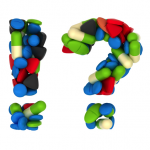
Depression is common in primary care and associated with a substantial personal, social and societal burden. There is considerable ongoing controversy regarding whether antidepressant pharmacotherapy works and, in particular, for whom. One widely-prescribed antidepressant is fluoxetine (Prozac), an antidepressant of the selective serotonin reuptake inhibitors (SSRI) class. Although a number of more recent antidepressants are available, fluoxetine (which went off patent in 2001) remains highly popular and is commonly prescribed.
This systematic review and meta-analysis, published through the Cochrane Collaboration, compares the effects of fluoxetine for depression, compared with other SSRIs, tricyclic antidepressants (TCAs), selective noradrenaline reuptake inhibitors (SNRIs), monoamine oxidase inhibitors (MAOIs) and newer agents, as well as other conventional and unconventional agents. This is an important clinical question – different antidepressants have different efficacy and side effect profiles, but direct comparisons are relatively rare.
Methods

Thank goodness for systematic reviewers who read hundreds of papers and combine the results, so you don’t have to
The review focused on studies of adults with unipolar major depressive disorder (regardless of the specific diagnostic criteria used), searching major databases for studies published up to 11 May 2012.
All randomised controlled trials comparing fluoxetine with any other antidepressant (including non-conventional agents such as hypericum, also known as St John’s wort) were included. Both dichotomous (reduction of at least 50% on the Hamilton Depression Scale) and continuous (mean scores at the end of the trial or change score on depression measures) outcomes were considered.
Results
A total of 171 studies were included in the analysis, conducted between 1984 and 2012 and comprising data on 24,868 participants.
A number of differences in efficacy and tolerability between fluoxetine and certain antidepressants were observed. However, these differences were typically small, so that the clinical meaning of these differences is not clear.
Moreover, the majority of studies failed to report detail on methodological procedures, and most were sponsored by pharmaceutical companies.
Both factors increase the risk of bias and overestimation of treatment effects.
Conclusions

The review found sertraline and venlafaxine (and possibly other antidepressants) had a better efficacy profile than fluoxetine
The authors conclude that:
No definitive implications can be drawn from the studies’ results.
There was some evidence for greater efficacy of sertraline and venlafaxine over fluoxetine, which may be clinically meaningful, but other considerations such as side-effect profile, patient acceptability and cost will also have a bearing on treatment decisions.
In other words, despite considerable effort and pooling all of the available evidence, we still can’t be certain whether one antidepressant is superior to another.
What this review really highlights is the ongoing difficulty in establishing whether some drugs are genuinely effective (and safe), because of publication bias against null results (Turner, 2008).
This situation is made worse when there are financial vested interests involved. Recently, there has been active discussion about how this problem can be resolved, for example by requiring pharmaceutical companies to release all data from clinical trials they conduct, irrespective of the nature of the findings.

Despite the mountains of trials published in this field, we still cannot say for sure which treatments work best for depression
Clinical decision making regarding the most appropriate medication to prescribe are complex, and made harder by the lack of direct comparisons. Moreover, the apparent efficacy of individual treatments may be inflated by publication bias. Direct comparisons between different treatments are therefore important, but remain relatively rare. This Cochrane Review provides very important information, even if only by highlighting how much we still don’t know about which treatments work best.
Links
Magni LR, Purgato M, Gastaldon C, Papola D, Furukawa TA, Cipriani A, Barbui C. Fluoxetine versus other types of pharmacotherapy for depression. Cochrane Database of Systematic Reviews 2013, Issue 7. Art. No.: CD004185. DOI: 10.1002/14651858.CD004185.pub3.
Etchells, P. We don’t know if antidepressants work, so stop bashing them. The Guardian website, 15 Aug 2013.
Turner EH, Matthews AM, Linardatos E, Tell RA, Rosenthal R. Selective publication of antidepressant trials and its influence on apparent efficacy. N Engl J Med. 2008 Jan 17;358(3):252-60. doi: 10.1056/NEJMsa065779. [PubMed abstract]


Cochrane review says there’s insufficient evidence to tell whether fluoxetine is better or worse than other tr… http://t.co/tpxDxfq6f4
@Mental_Elf personally still too many side effects. But effective
Another great blog from @MarcusMunafo – #CochraneEvidence on fluoxetine vs other antidepressants for depression http://t.co/OxU6okl0kG
@Mental_Elf @MarcusMunafo 13 months off SNRI and I’m sure I’m still effected by side effects from it. Say no to meds unless in extremis.
Cochrane review cast doubt on effectiveness of fluoxetine in depression compared to other treamtents http://t.co/3B25ZL9uY5 via @sharethis
Cochrane review: insufficient evidence whether fluoxetine is better/worse than other treatments for depression http://t.co/eQnnf0KSfl
TARG’s @MarcusMunafo has blogged for @Mental_Elf on the Cochrane review on fluoxetine and depression http://t.co/eqSgnziR0o
@cochranecollab find that sertraline & venlafaxine have a better efficacy profile than fluoxetine for depression http://t.co/OxU6okl0kG
Great blog by @MarcusMunafo; Cochrane review on depression pharmacotherapy shows we just don’t know what’s best http://t.co/9ch5aZk1Hk
Depression, antidepressants, publication bias and uncertainty. @MarcusMunafo explains why we’re in such a pickle http://t.co/OxU6okl0kG
Don’t miss: Insufficient evidence to tell whether fluoxetine is better or worse than other treatments for depression http://t.co/OxU6okl0kG
Cochrane review: insufficient evidence whether fluoxetine > or < than other treatments for depression http://t.co/o0eaT8HVac via @sharethis
Cochrane review: insufficient evidence whether fluoxetine better/worse than other treatments for depression http://t.co/uU2M2swsFe
Cochrane review says there’s insufficient evidence to tell whether fluoxetine is better or worse http://t.co/0OioLmzCFp
Mental Elf: Cochrane review says there’s insufficient evidence to tell whether fluoxetine is better or worse than… http://t.co/FfpDaP6hQH
From @Mental_Elf insufficient evidence to tell if fluoxetine is better or worse than other treatments for #depression http://t.co/fSATeInHhL
Is fluoxetine better or worse than other treatments for #depression? @mental_elf blogs the latest #CochraneEvidence: http://t.co/7ei1PNHSDM